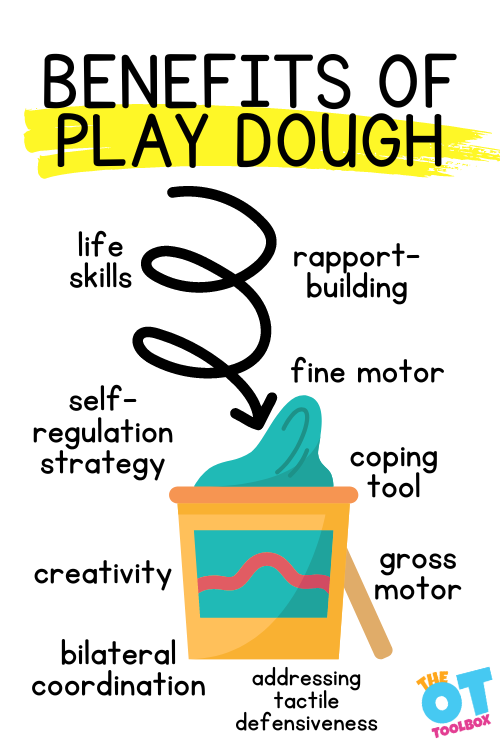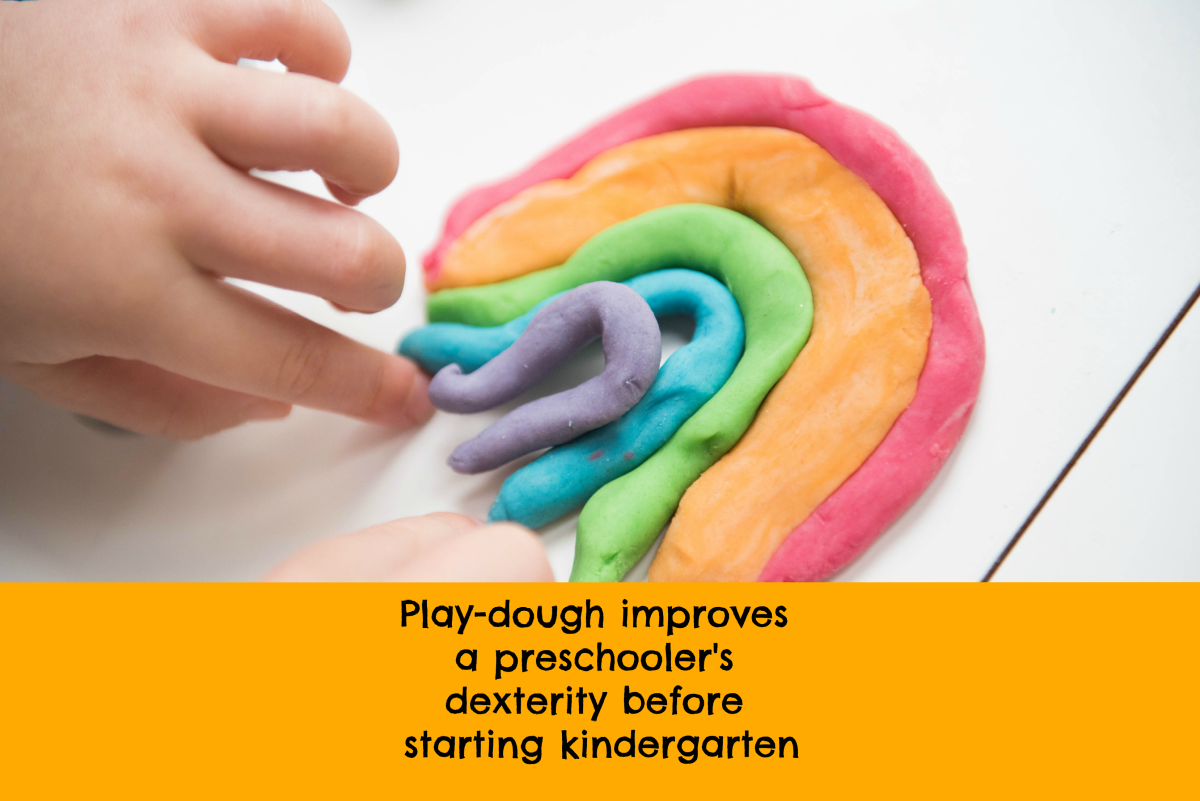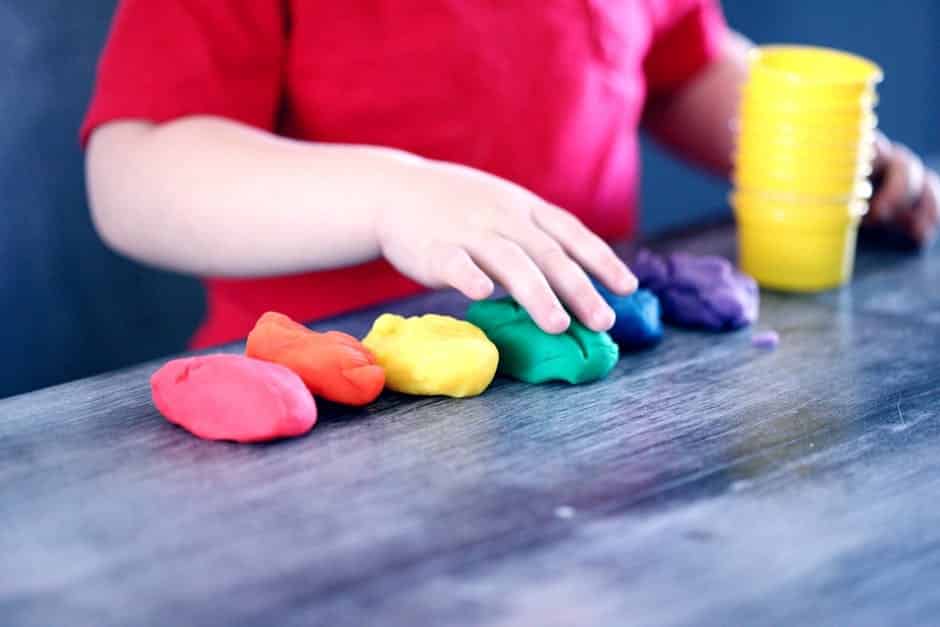
The Benefits of Playing with Playdough Playdough activities, Playdough, Preschool playdough
Why is play dough good for child development? For toddlers, play dough is an important material to promote fine motor skills and stimulate sensory systems. Playing with dough is a chance to build language by naming objects and sharing creations. Discover fun play dough activities for toddlers.

Benefits of playdough in the preschool classroom Preschool classroom, Playdough, Teaching
Other benefits of using playdough during early childhood include developing color recognition, making size comparisons, and sensory awareness. As children roll out their creations, they notice colors. They also begin to learn how colors may vary depending on which combinations they use. Children start to understand the varying sizes of objects.

Benefits of play dough The OT Toolbox
The Magic of Play dough Playdough is one of the most magical and versatile toys available for children. It's a simple, non-toxic, and inexpensive material that can be used in countless ways to promote creativity, imagination, and art. Here are some of the reasons why playdough is so special: It's Open-Ended

The Benefits Of Playing With Playdough Playdough, Benefit, Activities for kids
From rolling out snakes to crafting intricate shapes, playdough encourages creativity and self-expression, helping children develop their artistic abilities. 3. Language Development: The Dough of Conversation Playdough catalyzes language growth and communication skills.

How PlayDough Can Help Your Child Get Ready for Kindergarten WeHaveKids
There are many benefits of children playing with playdough including developing fine motor skills, creativity, vocabulary, literacy and numeracy and much more. Playdough also: Motivates children to explore its sensory qualities Strengthens small fingers, hands and wrists Builds children's imagination as they play with it, creating as they wish

There are plenty of benefits that come with playdough such as fine motor development. What can
1.Awe And Wonder In the UK this a phrase that is bandied around a lot - Awe and Wonder. It is a beautiful concept - that sense of heightened curiosity and engagement that children get when in the presence of certain exciting experiences. Playdough offers this in bucketloads.

The Power Of Playdough 9 Brilliant Benefits Of Playing With Playdough (With images) Keeping
Fine Motor Skills: This helps in your children's hands develop the strength, dexterity, and control needed to manipulate everyday items such as scissors, pencils, zippers, and buttons. Socioemotional Skills: Playdough provides a lot of open-ended opportunities for children to experience independent and cooperative play.

7 Benefits of Playdough in Early Childhood in 2021 Easy kid activities, Learning through play
Benefits of Playdough for Kids 1.Fine Motor Development. By squishing, rolling, cutting, and poking the playdough, kids are actually giving their muscles a great workout. Their little hands build up strength, and this will help them get ready for using scissors and learning to hold a pencil to write. 2. Maths and Literacy Development

5 Benefits of Playing with Play Dough A Simple Activity to Develop Your Child's Fine Motor
Playdough, the humble arts and crafts material with infinite possibilities. The benefits of playdough for toddlers are truly mind-blowing. To think that a simple recipe combining water, flour, oil, and a splash of food colouring can become something that has the power to transport children off into imaginary worlds of exploration and fantasy.

The Benefits of Playdough Made Easy With Playdough Food Creations
Social and emotional development Creating with playdough lets children feel competent ("I'm good at rolling the dough") and proud of their accomplishments ("Hey, I made a dog"). Pounding, flattening, and squeezing are healthy and safe outlets for extra energy. They can also help children cope with strong feelings.

The Power Of Playdough 9 Brilliant Benefits Of Playing With Playdough Nurtured Neurons Fun
1.Calming Many children are calmed down by playdough. I think there are many reasons behind this. One is that it is a really physical experience. It involves using your hands and squeezing, rolling and fiddling. Lots of children become anxious or restless in situations where they cannot touch or manipulate things.

7 Benefits of Playdough in Early Childhood Toddler development, Early childhood, Infant activities
Playdough, the humble arts and crafts material with infinite possibilities. The benefits of playdough for toddlers are truly mind-blowing. To think that a simple recipe combining water, flour, oil, and a splash of food colouring can become something that has the power to transport children off into imaginary worlds of exploration and fantasy.

Benefits of Play Dough For Toddlers P2 educationaltoysfortoddlerslearning Fine motor skills
There are many benefits to playing with playdough for toddlers and it can provide hours of creative play for them. The benefits of playing with playdough include developing fine motor skills, improving hand and eye coordination, and encouraging creativity and imaginative play.

The Benefits of Playing with Playdough Our Little House in the Country
Using play dough (or in fact any type of dough) with young children is beneficial for their development in so many ways. Here are some ideas of how fabulous it is, divided into the areas of development that it helps: Fine motor development:

The Benefits of Play Dough in Early Childhood ⋆ Parenting Chaos Playdough, Playdough
1. It develops fine motor skills While your kids are molding play dough into different shapes, they are actually building up strength in their tiny hands.

10 Benefits of Play Dough MiniOwls Blog MiniOwls
1. Fine Motor Development Moulding playdough is excellent for developing a child's fine motor skills. Children need to develop their finger muscles and have proper finger control before they can learn to write at school. During the preschool years, they develop these muscles through a variety of play activities.